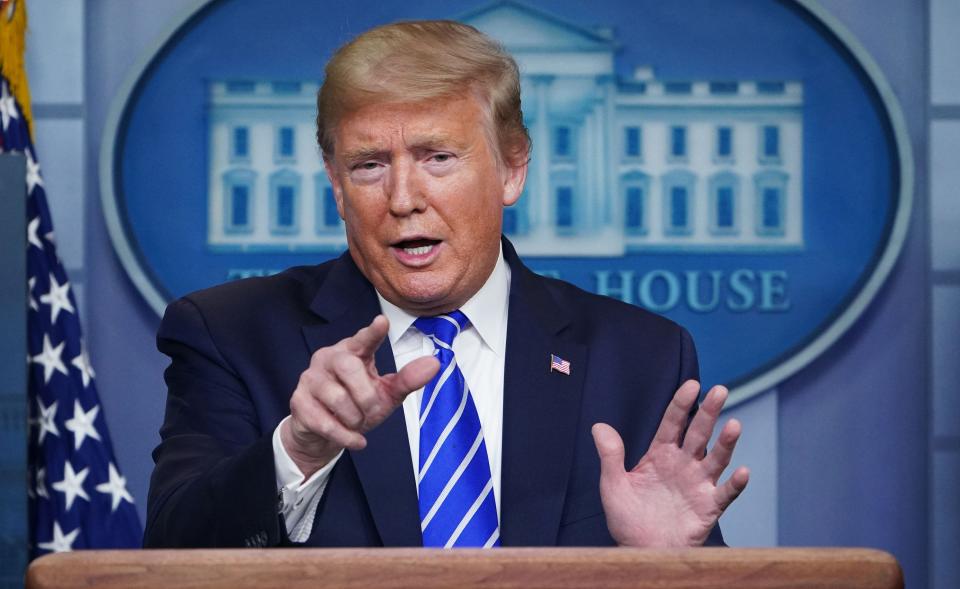With inflation up again, Trump says U.S. was better off 4 years ago. Well, except for that pandemic.
Donald Trump has again asked Americans a pivotal, comparative question.
"Are you better off than you were four years ago?" Trump posted on his social-media platform. "I don't think so."
To emphasize the point, Trump posted a chart on Monday comparing inflation at the same point in his and President Joe Biden's presidencies.
The complication, of course, is that four years ago, in April 2020, the United States and much of the planet closed down their economies and people sheltered in isolation as the coronavirus swept the planet's urban centers and rural stretches.
Inviting the comparison, some have commented, lacks self-insight by Trump. Among those is Biden, who lashed out at the 2024 presumptive Republican presidential nominee in a Scranton, Pennsylvania speech last week by reminding attendees of Trump's theorizing at the time about the use of disinfectants and sunlight to combat the coronavirus.
So, what's behind the resurrecting of the quote Ronald Reagan first made part of the political lexicon 44 years ago? Here are seven things to know.
1. What Trump said at pandemic briefing on April 23, 2020
In that White House briefing on April 23, 2020 — four years ago today — Trump said:
"So, supposedly we hit the body with a tremendous, whether it’s ultraviolet or just very powerful light, and I think you said that hasn’t been checked, but you’re going to test it.. And then I said supposing you brought the light inside the body, which you can do either through the skin or in some other way. And I think you said you’re going to test that, too. Sounds interesting, right?"
He then added: "And then I see the disinfectant, where it knocks it out in one minute. And is there a way we can do something like that, by injection inside or almost a cleaning, because you see it gets in the lungs and it does a tremendous number on the lungs, so it’d be interesting to check that, so that you’re going to have to use medical doctors with, but it sounds interesting to me. So, we’ll see, but the whole concept of the light, the way it kills it in one minute. That’s pretty powerful."
Last week, Biden reminded people attending his speech of Trump's statements.
"When the pandemic hit, Trump failed the most basic duty any president owes the American people, a duty to care and a duty to respond," said Biden, who will be in Tampa today. "Remember when he told us 'Don't worry, this will be all over by Easter'? Remember when he told us, literally, to inject bleach? Because he failed to care, not only did people die but millions Americans lost their jobs, their homes, their livelihoods."

2. It's inflation that's largely behind Trump's 2024 versus 2020 comparison.
Trump raised it within the context of another consumer price index report showing inflation remains a persistent challenge. On April 11, the CPI showed a 3.5% increase for March, a figure that was higher than expected.
The former president's PAC, Make America Great Again Inc., called the report "Biden's inflation crisis" and stated: "The latest Consumer Price Index report shows that overall prices are up 19.4% since Joe Biden took office."
Speaking in Atlanta earlier this month, Trump said the CPI report "was very high, very bad" and the Biden administration has no answer.
Campaign 2024: Trump asks, 'Better off today than 4 years ago?' Biden says yes, adds: 'Let's talk about it.'
"Biden has totally lost control of inflation," he said. "It's back. It's raging."
3. What Biden said about rising prices.
In a statement, President Joe Biden said inflation is down more than 60% from its peak but conceded his administration has "more to do" to ease the burden on American families.
"Fighting inflation remains my top economic priority. We’re making progress: Wages are rising faster than prices, incomes are higher than before the pandemic, and unemployment has remained below 4% for the longest stretch in 50 years," the statement read. "But we have more to do: My agenda is lowering costs for prescription drugs, health care, student debt, and hidden junk fees.
4. Biden team on 2020 versus 2024: 'Let's talk about it.'
The Biden-Harris 2024 campaign issued an economic comparative of the past four years last month.
“Let’s talk about four years ago: Under Trump’s egregious mismanagement, hundreds of thousands of Americans died who didn’t have to, crime shot up, our economy crashed, he fomented violence in the streets, and he even told us to inject ourselves with bleach," said campaign spokesperson Ammar Moussa in a statement.
The campaign also claimed:
In 2020, U.S. life expectancy fell by nearly two years, the largest one-year drop since World War II.
Nearly 10 million Americans lost their jobs, almost doubling the number during the 2009 economic crisis.
2020 saw Black and Hispanic unemployment skyrocket to nearly 10%.
An estimated 9.4 million small businesses shuttered.
U.S. manufacturing hit a historic low.
5. Trump bemoans lack of credit for 'fantastic job' on pandemic. Historian offers explanation.
During his Mar-a-Lago "Super Tuesday" victory speech on March 5, Trump lamented that his administration's pandemic management has not been fully appreciated.
"We did a fantastic job on that. We never got credit for that," he said. "We never got the kind of due that we should have for the COVID, or as I call it, affectionately, the Chinese virus, the China virus."
Presidential historian Robert Watson said there is a reason.
"In any way shape and form, if you look at what made the greats great when there was a crisis, Trump falls short," said Watson, who teaches at Lynn University in Boca Raton.
Watson said the assessment is neither partisan nor totally subjective. It's based on long-held basics for analyses of presidential action, decision-making and legacies so often dissected in academic journals, scholarly conferences and debates over presidential rankings.
It's the same rubric used to assess Abraham Lincoln and the Civil War, or Franklin Roosevelt and the Great Depression, or Theodore Roosevelt and the pressure for conservation, or George H.W. Bush as the Berlin Wall collapsed, or Lyndon Johnson on civil rights.
"Every president gets a handful of really big issues that come across their plate, and those are things that separate the greats from everybody else," he said. "In a hundred years, the first line on your bio, the legacy of a president is not something you do on a Tuesday afternoon, or a bill you signed in September. It's the crisis stuff. It's when the you-know-what hits the fan and how you respond to the big issues."
There, historical analysis adjudicates based on some key markers, including whether the president sitting behind the Resolute Desk took ownership of the emergency and rallied the country with "honest and frank" discussions. Examples, he said, were FDR's fireside chats or Lincoln's speech at Gettysburg and his second inaugural address to the nation.
In Trump's case, said Watson, who has long been a voter in C-SPAN's presidential rankings, that's where his standing in history slides mightily. Scholars fault him, he said, for his erratic approach, such as promoting ill-advised treatments, calling the pandemic a "hoax" and undermining the nation's public health experts.
"Trump tried to avoid all responsibility," he said. "I don't think anybody with a serious face could say that Trump was able to put a check mark in any of those boxes."
6. Trump's message on economics resonates with voters, polls show.
Nonetheless, Trump has hammered home, in rally speeches and social media posts, that Americans of all walks of life "were better off under" his administration and has touted "MAGAnomics" as far superior to "Bidenomics."
The message seems to be gaining traction as polls show voters agree with the former president.
A CBS News/YouGov survey issued last month had 46% of respondents rating Trump's term as excellent or good, while just 33% of them said the same about Biden's administration. And 65% said the economy was good under Trump versus just 38% said the same about the past three years under Biden.

An NBC News survey of voters released in February showed 55% said they felt Trump "would be better" when it comes to "dealing with the economy" and just 33% said Biden, a 22-point gap.
And an FAU-Mainstreet Research poll issued this week showed that those between the ages 18 and 34 chose Trump by a landslide, 54.4% to 36.6%, over Biden. The gap narrowed but still favored the former president in the 35-to-49 bracket, 48% to 43.6%.
One factor in that result is that younger Americans are still struggling financially, and with the fallout of pandemic policies, and generally feel dissatisfied and discontented with their economic standing, said Carol Bishop Mills, a professor at the School of Mass Communication & Multimedia Studies at Florida Atlantic University.
7. COVID-19 ranks among top national emergencies, but had been absent from political discourse.
The global pandemic ranks among the top national emergencies of the past century, along with the Great Depression, the bombing of Pearl Harbor that roped Americans into World War II, the Sept. 11 terrorist attacks and the Great Recession of the late 2000s.
But the crisis that irrevocably changed ways of life across the United States had been largely absent from the current presidential campaign. Analysts said Americans' profound resentment toward COVID policies and restrictions that upended the early years of the decade provided neither camp with a clear advantage.
"It's not a great differentiator between the two of them," said Chris Tuttle, a senior fellow at the New York-based Council on Foreign Relations, of why neither presidential candidate could gain an advantage. "And you're dealing with a lot of hangover effects and a generalized perception among the general public that there was an overreaction."
Pandemic? What pandemic? Four years later, coronavirus no factor in 2024 Biden-Trump rematch
Others say the use of the Reagan quote may be a "misguided" move.
"Four years ago we were fighting with people over toilet paper in the middle of a Costco aisle and using coffee filters if you couldn't find any," Mills said after Trump first raised the question last month. "So I did think they are misguided in asking that particular question."
Antonio Fins is a politics and business editor at The Palm Beach Post, part of the USA TODAY Florida Network. You can reach him at [email protected]. Help support our journalism. Subscribe today.
This article originally appeared on Palm Beach Post: Trump says U.S. was better off four years ago. Except for pandemic.
